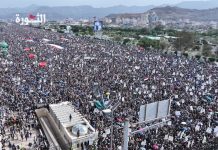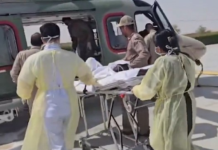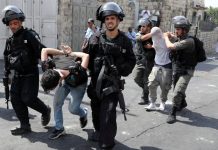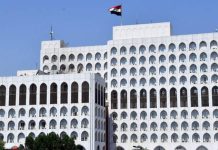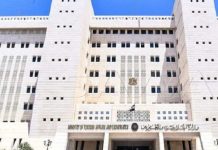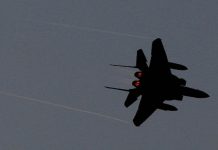The security services in Sana’a revealed details of one of the most important counter-operations carried out by the Yemeni security services against the projects of the Saudi intelligence agencies.
The security media published a video entitled “In the Grip of Security”, revealing new details and information related to the assassination of Minister Hassan Zaid and several assassination attempts and operations carried out by members of the Saudi intelligence in the capital, Sana’a, Ibb and Dhamar.
The security film “In the Grip of Security” presents the war between the Yemeni intelligence and the Saudi intelligence in light of the aggression, which is working to detonate the situation from within, while the security services are doing their part to preserve public tranquility and the home front.
The film reveals the mechanism of work of the Saudi intelligence in forming criminal cells, and exposes, with information and pictures, a number of those associated with the Saudi intelligence who were involved in this treacherous aspect.
It also reveals the identity of the mercenary Mohammad Ali al-Maqdishi and the mercenary Fadl Hussein al-Maqri as two main members who assumed the formation of two cells of aggression. The first, led by Tariq Mohammad Ahmad al-Ghazali, was entrusted with opening a front in the Baadan Ibb region to disturb security and destabilize the home front, but the mission failed.
The second cell carried out assassinations attempts against a number of social and official figures in Sana’a, Ibb and Dhamar.
The film also reveals the details of one of the counter-operations of the Yemeni security services, during which they recorded success in facing the plots of hostile foreign intelligence, and strengthening their position and successes after reunifying them.
It also reveals that Tariq Mohammad Ahmad al-Ghazali was assigned to form a cell whose mission would be to open a front to disturb security in Ibb governorate. And how were the transfers of funds and the purchase and dispatch of weapons for the purpose of detonating the situation militarily in the Baadan region of Ibb.
In the details, the Saudi intelligence tended to direct its members to carry out assassinations targeting national figures opposed to the aggression. A cell was formed under the leadership of Mohammad Ali Ahmed Al-Hanash. It was entrusted with carrying out assassinations in Dhamar, Ibb, and the capital Sana’a, the last of which was the assassination of the martyr minister, Hassan Zaid.
The film gives details of the assassination of the martyr minister Hassan Zaid, re-enacting the crime scene of the monitoring and assassination. The members of the cell themselves acted out the scenes, according to their confessions, how the minister was pursued and how the assassination was carried out.
The film shows how the security services determined the path of the criminals and the mechanisms used in the crime in less than an hour, despite their intention to target the minister, accompanied by his daughter, in a security-blind area at the time in the capital Sana’a.
This made it possible to track down the perpetrators before they fled to the territories occupied by the US-Saudi aggression.
The film showed the last details of the head of the cell called Al-Hanash and his acknowledgment of the crime of assassinating the martyr minister, Hassan Zaid, and the role of society in obtaining information that helped dismantle the criminal cell.
The film also reveals the mystery of two assassinations that took place in Dhamar, one of which targeted the martyr Abdullah Al-Salami, and the other an attempt to assassinate Professor Abdulkarim Al-Habsi, who survived after being seriously injured.
It also reveals a failed assassination that targeted the deputy governor of Ibb, Abdulwahed al-Marou’i. The monitoring of the cell is documented by figures in the government and national figures opposed to aggression.
The film discusses the impact of the transformations that resulted from the reformulation of the security services according to rules that make them devices for the people, not the authority. Also the mechanism of cooperation between the security agencies according to the new vision of their work in exchanging information, achieving the desired effect and overcoming the legacy of the past. Exposing those involved in the assassination of the martyr minister Hassan Zaid in a matter of hours and ending and dismantling the cell within 48 hours is one of the most important effects. As well as the treacherous role of mercenaries in enabling foreign intelligence to recruit spies to serve the aggression against their country.
In addition to the new and detailed information in one of the folds of confrontation and targeting of the Yemeni home front, the film hosts distinguished military, security, intelligence and scientific figures who enrich the scene of the security and intelligence war within its broad horizons.
The film documents one of the stations of success for the security services, in a continuous war that will not stop with the silence of the guns and the fluttering of peace flags.
Source: Al-Masirah Net


